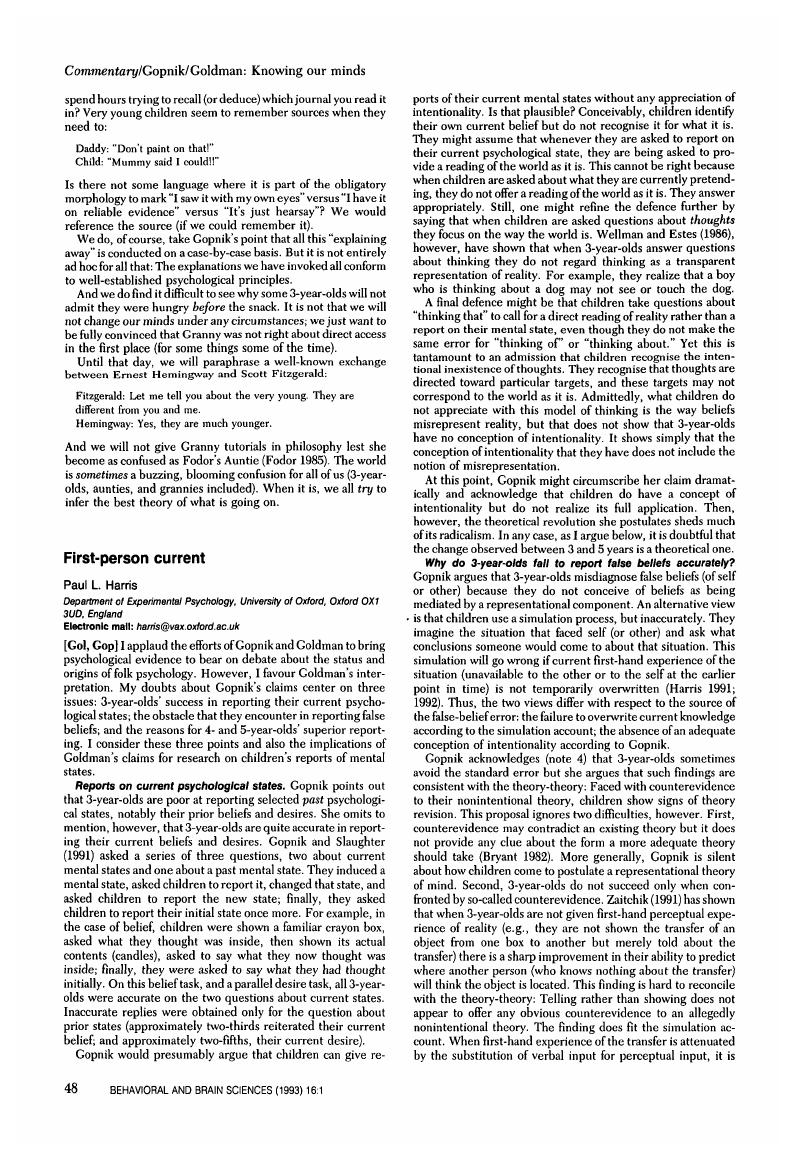Crossref Citations
This article has been cited by the following publications. This list is generated based on data provided by Crossref.
Greve, Werner
and
Buchner, Axel
1995.
Speaking of beliefs: Reporting or constituting mental entities?.
Behavioral and Brain Sciences,
Vol. 18,
Issue. 2,
p.
391.
Pust, Joel
1995.
Two kinds of representational functionalism: Defusing the combinatorial explosion.
Behavioral and Brain Sciences,
Vol. 18,
Issue. 2,
p.
392.
Gopnik, Alison
1995.
How to understand beliefs.
Behavioral and Brain Sciences,
Vol. 18,
Issue. 2,
p.
398.
Bogdan, Radu J.
1995.
The epistemological illusion.
Behavioral and Brain Sciences,
Vol. 18,
Issue. 2,
p.
390.
van Brakel, J.
1995.
Interpreting self-ascriptions.
Behavioral and Brain Sciences,
Vol. 18,
Issue. 2,
p.
393.
Goldman, Alvin I.
1995.
Epistemology, two types of functionalism, and first-person authority.
Behavioral and Brain Sciences,
Vol. 18,
Issue. 2,
p.
395.
RUFFMAN, TED
1996.
Do Children Understand the Mind by Means of Simulation or a Theory? Evidence From Their Understanding of Inference.
Mind & Language,
Vol. 11,
Issue. 4,
p.
388.
Taumoepeau, Mele
and
Ruffman, Ted
2006.
Mother and Infant Talk About Mental States Relates to Desire Language and Emotion Understanding.
Child Development,
Vol. 77,
Issue. 2,
p.
465.
Rai, Roshan
and
Mitchell, Peter
2006.
Children's Ability to Impute Inferentially Based Knowledge.
Child Development,
Vol. 77,
Issue. 4,
p.
1081.
Thompson, Bruce
and
Thornton, Bill
2007.
Exploring Mental-State Reasoning as a Social—Cognitive Mechanism for Social Loafing in Children.
The Journal of Social Psychology,
Vol. 147,
Issue. 2,
p.
159.
Mitchell, Peter
Currie, Gregory
and
Ziegler, Fenja
2009.
Two routes to perspective: Simulation and rule‐use as approaches to mentalizing.
British Journal of Developmental Psychology,
Vol. 27,
Issue. 3,
p.
513.
Chelini, Chiara
2011.
Hayek in Mind: Hayek's Philosophical Psychology.
p.
199.
Harris, Paul L.
Ronfard, Samuel
and
Bartz, Deborah
2017.
Young children’s developing conception of knowledge and ignorance: work in progress.
European Journal of Developmental Psychology,
Vol. 14,
Issue. 2,
p.
221.



